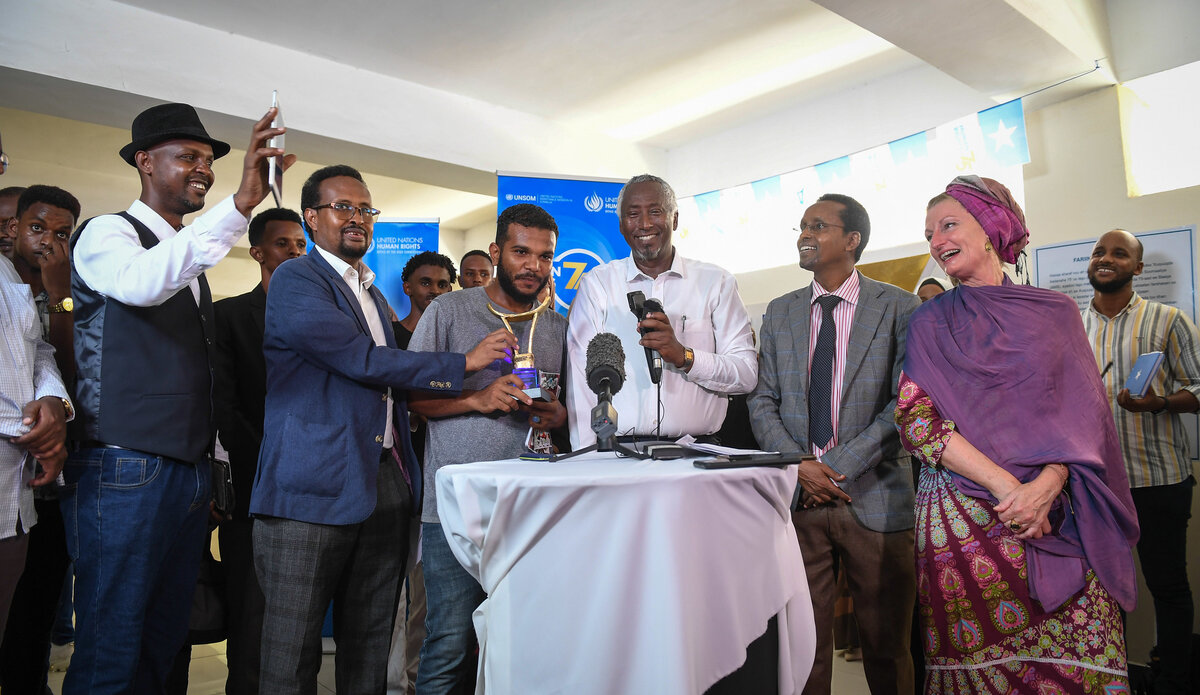National Museum and UN hold Somalia’s first-ever human rights art competition
Mogadishu – The power of art to inspire and transcend came under the spotlight today at Somalia’s first-ever human rights art competition, aimed at raising awareness about human rights and fostering dialogue and debate on issues of importance to Somalis.
“I am very delighted to witness this exhibition at the National Museum where 20 artists have been selected and to witness their creativity – it’s a privilege for us to be here and encourage them,” the State Minister from Somalia’s Ministry for Education, Culture and Higher Education (MoECHE), Ahmed Osman Ibrahim, said.
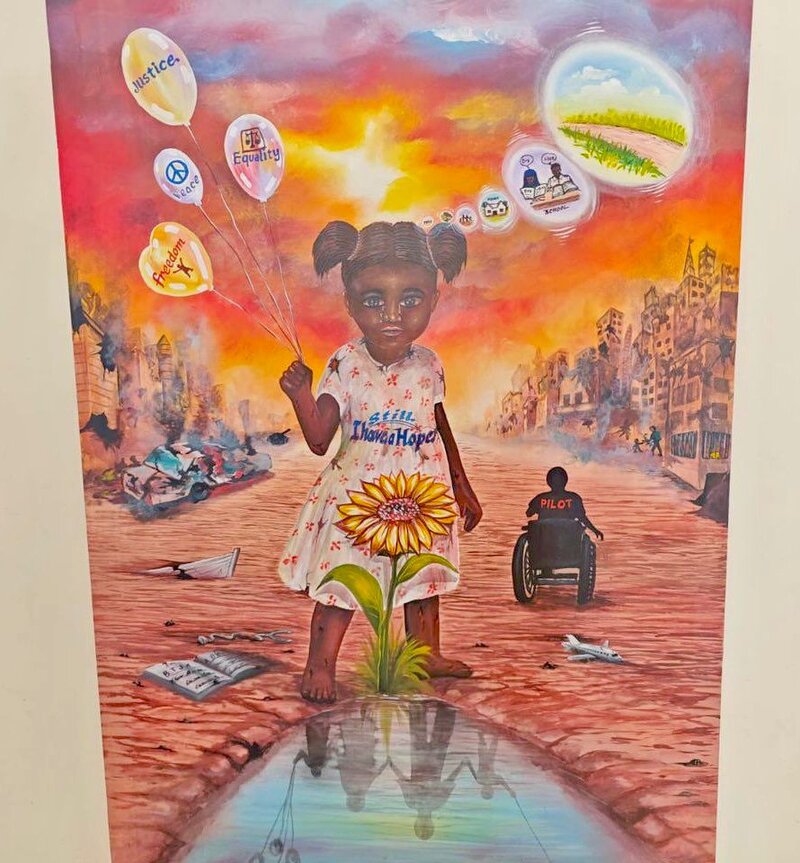
The government official was speaking at a ceremony to announce the winners of the competition in the Somali capital of Mogadishu. The competition, and its related exhibition, was jointly organized by the National Museum of Somalia and the United Nations.
“Today, we are here to open this exhibition for the Somali people so that they can come, visit and learn about human rights from the paintings at this exhibition,” said the Director of the National Museum, Dr. Osman Gedow Amir.
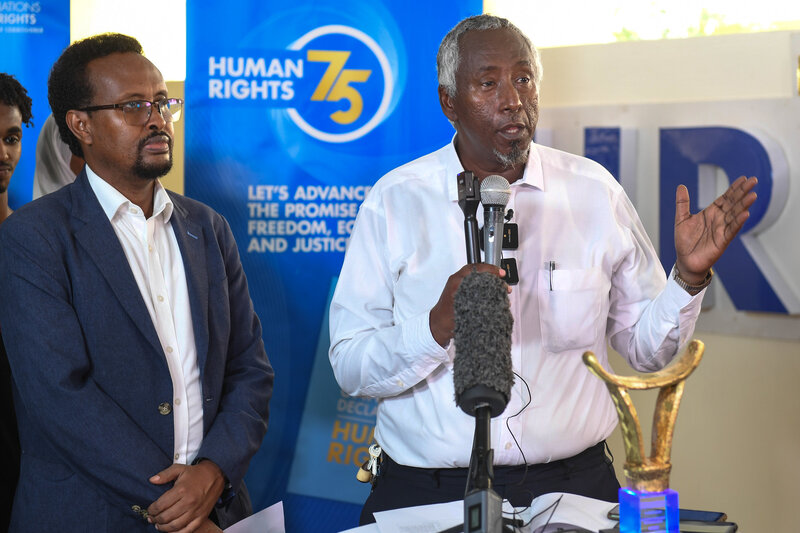
“I think that the exhibition that we see today is extremely powerful. I think we have all been touched by every piece that we have seen… and it is a very special gift that the National Museum is giving to Somali citizens – that it is possible to use this gorgeous space, to share, to document the history of Somalia and the rich culture, but also issues of justice, equality and hopes and dreams,” said the Chief of the UN Assistance Mission in Somalia’s (UNSOM) Human Rights and Protection Group, Kirsten Young.
“What we have seen with these pieces of art that we see all around in the room, have touched on extremely sensitive subjects and I think all of them have maintained hope. I think that is important because these are young artists and that’s how they see the future of Somalia: hopeful,” added Ms. Young, who also serves as the Representative to Somalia of the Office of the UN High Commissioner for Human Rights (OHCHR).
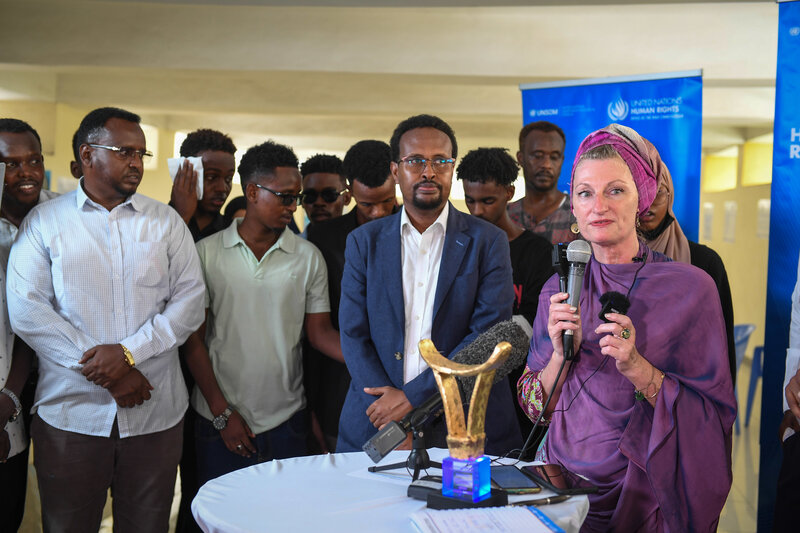
The exhibition ties into the UN’s activities to commemorate the 75th anniversary of the Universal Declaration of Human Rights (UDHR). The UDHR is a milestone document which was proclaimed by the UN General Assembly in 1948 as a common standard of achievements for all peoples and all nations. It sets out, for the first time, fundamental human rights to be universally protected.
“In the Universal Declaration, we have cultural rights embedded in there, but there are also other articles that touch on these rights, for example, the right to freedom of expression – artists wouldn’t be able to do their work unless they can freely express themselves, similarly you must be able to enjoy the right to leisure so you have free time to be able to pursue your interests,” noted Ms. Young.
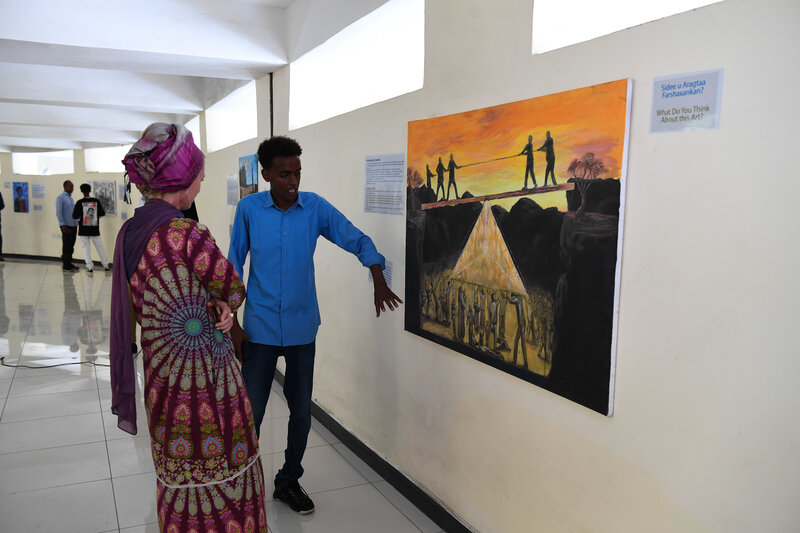
Many entries
The competition attracted 68 entries, with the three judges settling on a final shortlist of 20 before today’s announcement. The judging panel was made up of three independent artists.
UN human rights experts provided the shortlisted entrants with training on key human rights concepts, with a particular focus on the themes of the 75th anniversary of the UDHR: dignity, freedom and justice for all.
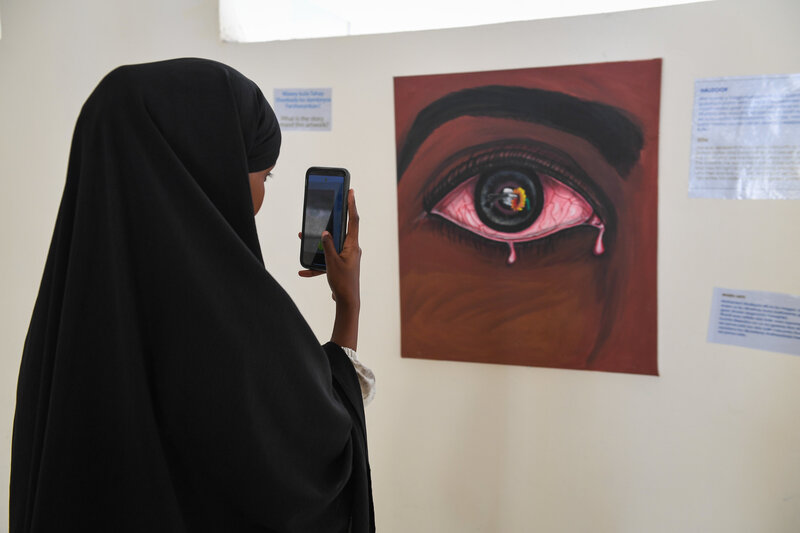
The winner was Mogadishu-based artist Salman Osman Shariif, with Mohamed Abdulkadir Mohamed and Abdi Aweys Hassan, coming second and third, respectively. The themes of their paintings were equality, justice and freedom.
Unfortunately, Mr. Shariif was unable to attend the event as he was involved in an accident while on his way to the National Museum. He received the call about his win while being treated in hospital and joined the celebration from his hospital bed.
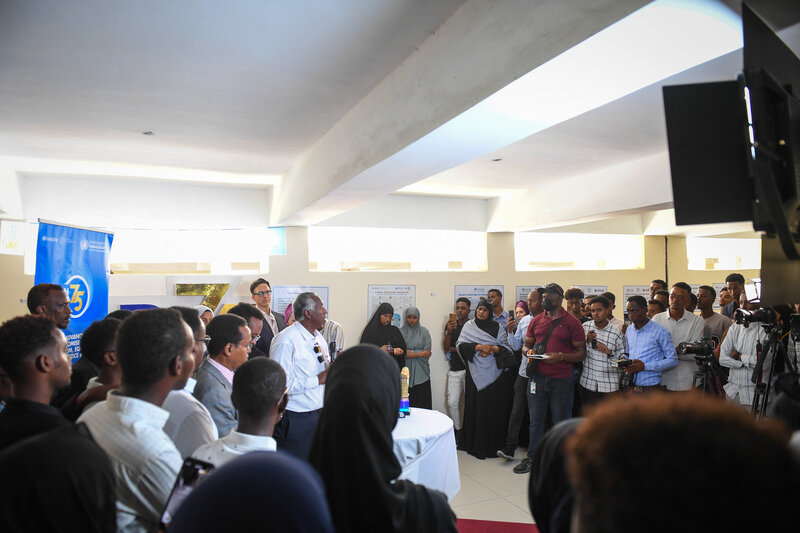
The third-place contestant, Mr. Hassan, said that when it came to art, winning and losing were immaterial.
“When I applied to take part in the competition, I was not motivated by the thought of winning – this is a win for me even if I am not the overall winner! Art can help us relate to human rights. It is a way of raising awareness on human rights issues. I use art to highlight issues of fairness, equality and social justice, and it can also play a role in peacebuilding,” said Mr. Hassan.
Another entrant, Hodan Abdullahi Mohamed, a second-year computer science student at Mogadishu University.
“I learned a lot from this [competition]. It presented an opportunity to meet fellow artists and it’s been an eye-opener for me,” said Ms. Mohamed, adding, “I use my art to highlight the injustices faced by women and girls.”
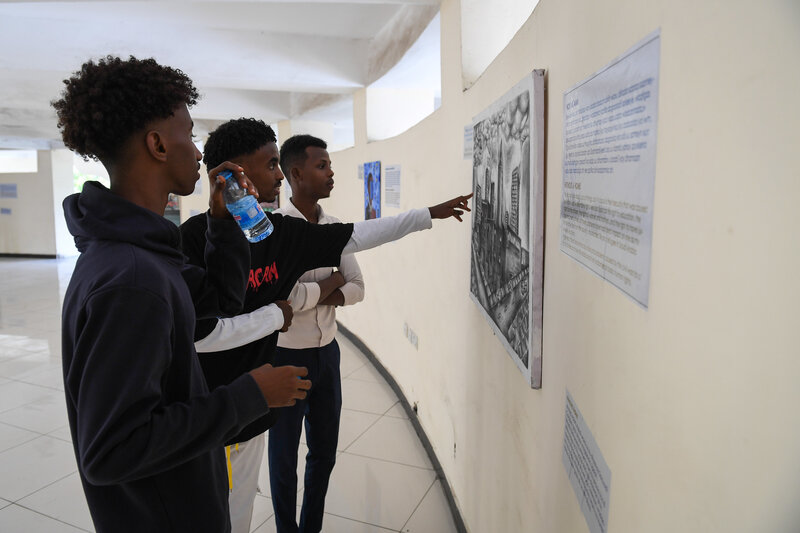
Cultural attraction
The National Museum of Somalia re-opened in July 2020. For close to 30 years prior to that, its doors closed and its many rooms empty.
Established in 1934 by Italian colonial authorities as the ‘Museo della Garesa,’ the cultural institution has endured experiences which few other museums ever have.
The building, also known as the ‘Bargash Museum,’ remained the museum’s home until 1985, when its collection, comprising around 3,500 objects, was moved to the newly-built building which has been its home ever since.
However, the violence and chaos of the civil war in the 1990s led to its closure for almost three decades. Federal authorities began essential repairs and rebuilding in 2019, before its re-opening three years ago.
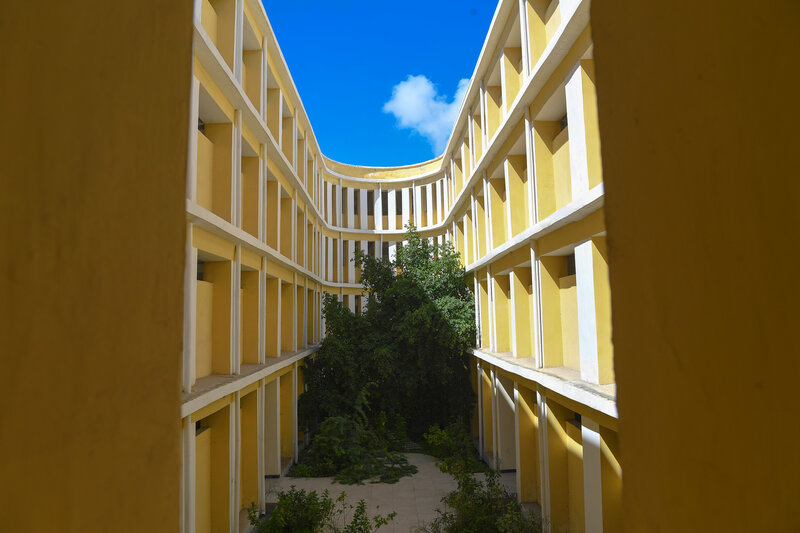
It has a long way to go to return to its glory days. While damage from the war has been repaired and new foundations and structures are in place, its halls and storage rooms remain exposed and dilapidated, and most of their older content was destroyed or looted during the most recent conflict.
Still there are high hopes events like today’s announcement, as well as the related exhibition, are a start.
In his remarks at the event, the Chairperson of the Somali Academy of Science and Arts, Abdulkadir Nor Hussein, noted the valuable role that cultural institutions and expressed the hope that more Somalis would avail themselves of cultural opportunities.
“The National Museum is a living book where you can learn your culture, which needs no translation. Just the same way you constantly visit Beerta Nabada (transl.: ‘Peace Gardens’), a tourist attraction, we also recommend you visit the Museum,” he added.
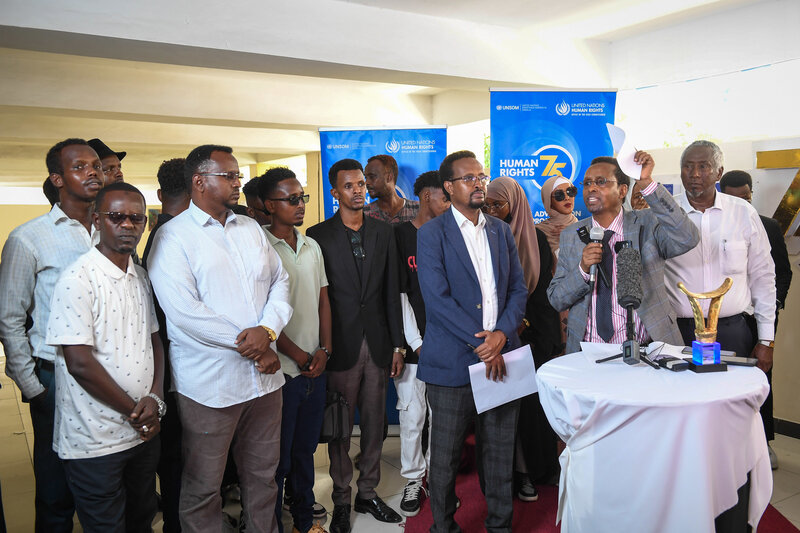
His words were echoed by the National Museum’s Director.
“As you can see, all these paintings on the walls were made by these youthful artists and they’ve done an exemplary job – we also urge the Somali people to come to the Museum and view these artistic works in order for them to learn about human rights,” Dr. Amir said.
“And we also want to applaud the participants and encourage them – they are all winners,” he added.
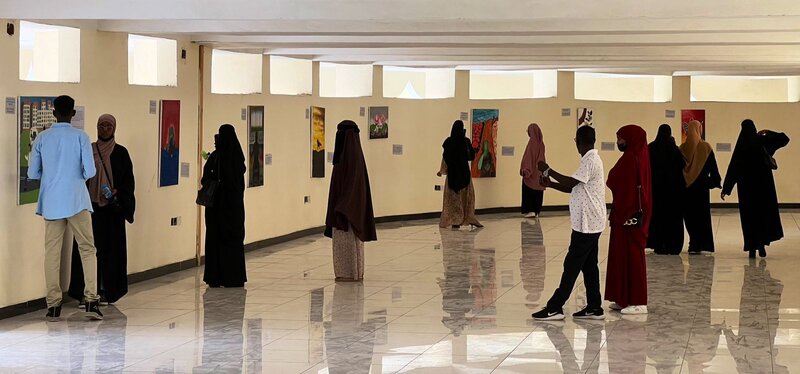
 UN
UN
